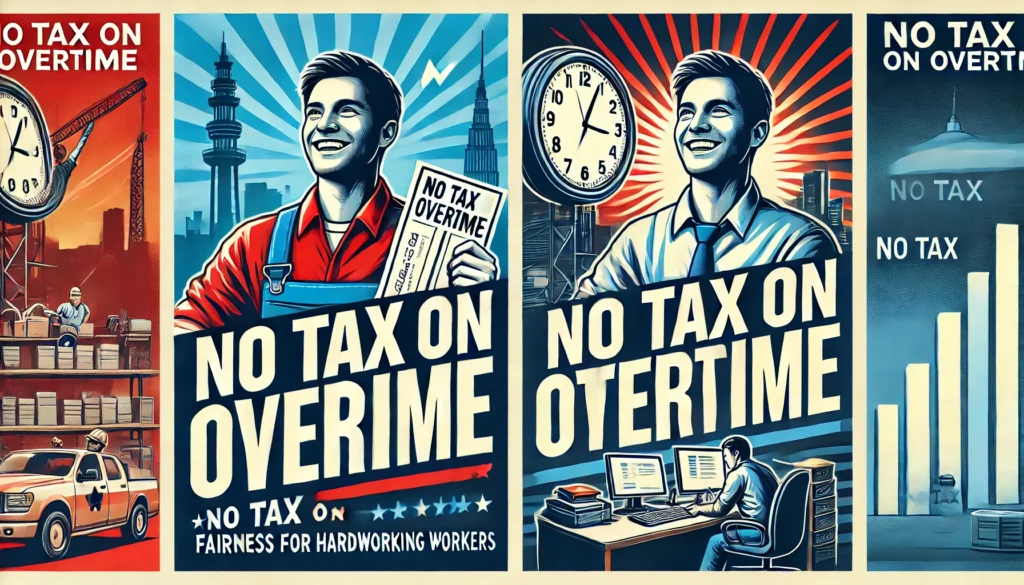And now is some very fun news in case you are among the 60 percent of Americans who do a job that would qualify them to earn overtime, Uncle Sam has offered you a huge favor. A huge change is on the way to the taxation of overtime pay, and it is high time.
President Trump signed the One Big Beautiful Bill (OBBB), his comprehensive tax reform bill which requires a No Tax on Overtime, on July 4, 2025. What does that mean for you? You might be in a position to record actual tax savings when you file your return next year in case you have been working additional hours.
We will get it all unpacked so you can see precisely what this is whether you are an hourly worker, salaried worker or a business owner.
What Is the No Tax on Overtime Law?
The No Tax on Overtime Act is officially added to the tax law of the U.S. and effective January 1, 2025, up to 2028. It enables workers that qualify to subtract as much as 12,500 or 25,000, as a married partner, of their federal taxable earnings as qualified overtime earnings.
Key Points:
- It is not an exemption, but a deduction, and thus, overtime is taxed towards Social Security and Medicare (FICA).
- The subsidy is phased off among the high income earners with a wage of over 150,000 a year. It applies only to federal income tax -state regulations might not.
Why This Law Was Passed
The idea is easy to understand: Put more cash in the pockets of the working Americans. Lawmakers want to:
- Incentivize productivity (particularly within such key sectors as healthcare and safety of the people).
- Incentivize overtime work
- Raise the level of disposable income but do not raise wages among employers.
President Trump has likewise expressed his intentions to increase this method of tips and Social Security income hence tune in.
Who is Eligible to receive the Overtime Tax Deduction?
You may be able to work hourly shifts or not on a salary, but there are a couple of boxes you will have to tick.
✅ Hourly Employees:
The majority of hourly employees are qualified. You qualify if:
- You are not exempted under fair labor standards act (FLSA).
- The working hours above 40 hours per week are paid overtime (time and a half).
- Your Social Security Number is valid.
Imagine: nurses, firefighters, police officers, retail workers, hospitality workers, warehouse workers–whatever.
✅Salaried Employees:
You may be, but it is somewhat more complicated:
- You have to be an employee who will be categorized as non-exempt under FLSA.
- You have to literally be paid overtime.
- You should earn less than a yearly of 150,000 dollars.
- You will have to keep a close count of your hours and overtime.
Therefore, in case you are on a salary but are working long hours and receiving overtime, this can be a benefit to you.

What Is the Tax Deduction?
The way that you will take your savings will be this:
- You will be entitled to claim as much as $12,500 of federal income in qualified overtime during the tax filing season (early 2026, in the case of the 2025 tax year).
- Joint filers can deduct up to $25,000.
- This income is subject to your payroll tax (FICA).
- The W-4s or paycheck withholdings have not been changed (at least not yet).
Noteworthy: This is a retroductory deduction. It follows that, provided that you have worked overtime at any time in 2025, by any time the law comes into effect (pre-2025), you will be able to claim it to your tax return in 2025.
What Employers Need to Know
This transformation may be awesome to your employees, yet it will have to be plotted behind the scenes. The following are what should be noticed by business owners and HR teams:
- Keep Good Records It is now necessary to properly track the amount of overtime and salaries. These records can be required by employees to do their tax returns.
- Update Systems Although there would be no change in 2025 in the processing of payrolls, changes in the withholding regulations may come up in the future.
- Expect More Overtime This tax deduction could encourage the employees to be ready to work additional hours. Be willing to switch shifts and manpower.
What This Means for Workers
This is more than a mere policy, this new law, it is cash in your pocket.
- Bigger Tax Refunds As the deduction is reported when filing taxes, you will not be seeing an increase in your paycheck. But come refund season? You might find a much larger deduction to the amount due–or a larger refund check.
- Increased Motive to Work Overtime There is now an added incentive to say yes to these additional shifts. You can use this deduction to save a house, pay off a debt or just be able to keep pace with inflation and save more of your hard earned money.
- Keep Your Records Keep your pay stubs, timecards or work logs to support your assertion. The auditors will demand documentation in case of an audit by the IRS.
A Quick Word on State Taxes
At this time, the No Tax on Overtime Act is limited to the federal income tax. All states have an opportunity to decide how they address the issue of overtime, and not every state will be following the example of the federal.
Discuss this with a tax advisor or accountant and how it applies in your state.
Concluding Analysis: Keeping Informed, Keeping Prepared
As a worker or an employer, this new tax regulation changes the game of treating overtime in America.
For Workers:
- Thousands of dollars in taxes may be saved.
- The greater the overtime that you do (reasonable), the higher the value of this deduction is.
For Employers:
- You will be required to monitor overtime.
- Way ahead of any upcoming changes in withholding regulations or compliance.
Need Help Managing Payroll?
Payroll systems are not created equal. In case you want to keep up to date and ensure that you are doing this right, and you are not wasting hours every week typing into spreadsheets, you can consider trusted payroll services such as Paycor. They are providing intuitive tools to support tax and labor law transformations such as this.
TL;DR (Too Long; Didn’t Read)
- The overtime compensation received in 2025-2028 can receive a federal tax deduction.
- Until up to 12,500 deductions on individuals / 25,000 on joint filers.
- Extends to non-exempt workers covered by FLSA that earn below 150K.
- Overtime should be duly registered.
- Inapplicable to Social Security/Medicare tax or ensure state tax breaks.
Also read: Business Ideas that can Start Online in 2025
Follow Us : youtube


